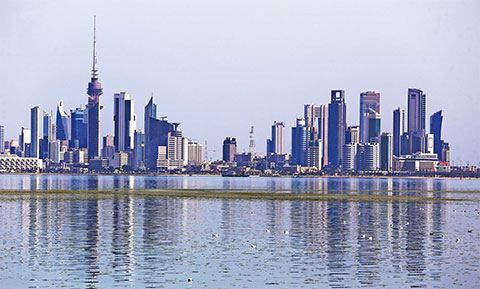KUWAIT: Kuwait is all geared up to host the ministerial meeting for the coalition to fight the so-called Islamic State (IS) today. The meeting is part of a series of international conferences that took place in order to build a formal coalition to destroy the IS, which had taken over large portions of Syria and Iraq in 2014. Since then, the coalition is now 68 countries strong beside other decision-making international organizations, namely the US, the UK, France, Italy, Spain, Sweden, Denmark, Norway, the Netherlands, Canada, New Zeeland, Australia and Turkey, in addition to members of the Gulf Cooperation Council, Iraq, Jordan and Morocco.
The first of these conferences took place in September 2014 in Jeddah, Saudi Arabia, where foreign ministers of Saudi Arabia, Kuwait, UAE, Bahrain, Qatar, Oman, Egypt and Jordan, met with former US Secretary of State John Kerry on what each of these countries would contribute to their common security in the matter. At the end of the conference, the Jeddah communique came out declaring support to the American military effort, and commitment to unite against the threat of terrorism, including that of IS.
In addition, the signatories vowed providing military support and humanitarian aid towards the effort, as well as agreeing to stop the flow of foreign fighters through neighboring countries, countering terror financing and extremist ideology, and enforce the necessary measures of justice against violators.
Five-point plan
In December of the same year, another meeting was held in NATO headquarters in Brussels, which resulted in a five-point plan to uphold the coalition. In January 2015, former British Foreign Minister Philip Hammond hosted the counter IS meeting in London. Twenty-one countries gathered as a small group of the global coalition.
The 21 key members of the global coalition reviewed efforts to degrade and defeat IS, not just through military force but also by addressing the underlying narrative of the organization, its financing, its flow of foreign fighters and by reasserting commitment to Iraq. In June 2015, Paris hosted yet another counter IS coalition conference, where all participants reasserted that The Global Coalition is united and committed to defeating IS.
Rome was the next host of the anti-IS international coalition meetings, as in February 2016, 23 countries reviewed operations and new ways of cooperation. The meeting was chaired by the US Secretary of State back then John Kerry and former Italian Foreign Minister Paolo Gentiloni.
Kerry had underlined that there should be no doubt that IS will be destroyed. The meeting also reviewed achievements made against IS in 2015 and analyzed future operations, as well as it explored new ways of cooperation. In July the same year, Washington hosted the Foreign and Defense Ministers of the Counter-IS Coalition Small Group, with Military Coalition and members that have made major non-military contributions convened to refine their common approach to IS affiliates in many regions of the world.
Berlin hosted the next version of meetings in November 2016 to review progress of collective effort to liberate Mosul, northern Iraq and to build momentum towards the isolation and liberation of Raqqa in Syria; both under the clutches of IS at the time.
Full coalition
In March 2017, US Secretary of State Rex Tillerson hosted the foreign ministers and senior leaders of the Global Coalition working to defeat IS in Washington. This meeting was the first for the full coalition, at 68 members, since December 2014. It included a detailed discussion of priorities for the coalition's multiple lines of effort, including military, foreign terrorist fighters, counterterrorist financing, counter-messaging, and stabilization of liberated areas, to increase the momentum of the campaign. Additionally, the ministers discussed the ongoing humanitarian crises in Iraq and Syria that are affecting the region.
In November 2017, Amman hosted meeting for the political leaders of the Global Coalition against IS with representatives of 27 countries, as well as four international organizations attending. It coincided with the positive developments in the war against terrorism in Iraq and Syria, as participants discussed the coalition's efforts to fight IS, especially after the liberation of Mosul and Raqqa from the terrorist group. The Global Coalition against IS was formed in September 2014 and is committed to degrading and ultimately defeating the extremist group. - KUNA











